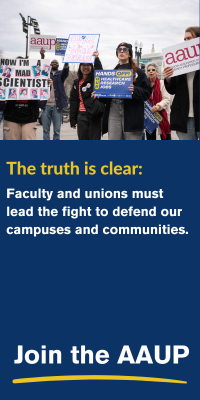- About
- Programs
- Issues
- Academic Freedom
- Political Attacks on Higher Education
- Resources on Collective Bargaining
- Shared Governance
- Campus Protests
- Faculty Compensation
- Racial Justice
- Diversity in Higher Ed
- Financial Crisis
- Privatization and OPMs
- Contingent Faculty Positions
- Tenure
- Workplace Issues
- Gender and Sexuality in Higher Ed
- Targeted Harassment
- Intellectual Property & Copyright
- Civility
- The Family and Medical Leave Act
- Pregnancy in the Academy
- Publications
- Data
- News
- Membership
- Chapters
AAUP Opposes NLRB Rule That Would Limit Graduate Organizing
Today the AAUP submitted comments to the National Labor Relations Board (NLRB) opposing a proposed rule that would bar many graduate assistants from engaging in collective bargaining. The NLRB takes the stance in its new proposed rule that students who are also teaching or research assistants at private colleges or universities are not employees and are therefore not entitled to unionize under the National Labor Relations Act. The AAUP’s comments reject this claim and strongly refute the board’s assertion that “academic freedom” supports the proposed rule.
The AAUP has long supported the union rights of faculty and graduate assistants. In addition to the other benefits it provides, collective bargaining is an effective tool to promote and protect academic freedom. AAUP chapters have established explicit guarantees of academic freedom in their collective bargaining contracts, sometimes incorporating language from the 1940 Statement of Principles on Academic Freedom and Tenure. These contracts make promises of academic freedom legally enforceable.
Graduate assistants perform specific work in return for compensation. The work they do is often indistinguishable from that performed by faculty members. And universities generally treat graduate assistant stipends as payment for teaching or research work, not as general financial support. As the AAUP’s comments make clear, graduate assistants are employees who should have the same rights as other private-sector employees under the National Labor Relations Act.
The AAUP’s comments also refute the NLRB’s assertion that potential harm to an institution’s academic freedom is a basis for excluding graduate assistants from collective bargaining, arguing that “collective bargaining by faculty and graduate assistants is one of several ways to promote academic freedom on campus, as it allows faculty, students, and administrators to discuss collectively how best to do their shared work of teaching and research.” Moreover, as the AAUP notes in its comments, “the full scope of academic freedom includes individual academic freedom of those who work for the university by engaging in teaching and research. . . . Indeed, the educational mission of the university depends on respecting the individual academic freedom of faculty and graduate assistants.”
The comments were expertly drafted by AAUP general counsel Risa Lieberwitz, professor of labor and employment law at Cornell University’s School of Industrial Relations, and Rana M. Jaleel, assistant professor of gender, sexuality, and women’s studies at the University of California, Davis; former AAUP general counsel Robert Gorman, Kenneth W. Gemmill Professor Emeritus in the University of Pennsylvania Law School, signed on to the comments. The comments are based on the AAUP’s long history representing the interests of the profession, its position as the preeminent authority on the meaning and scope of academic freedom, and its extensive experience representing faculty members and graduate assistants in collective bargaining.
The AAUP’s comments clearly demonstrate that graduate assistants have the right to unionize because they are employees under the National Labor Relations Act and that unionization advances their academic freedom. We urge the National Labor Relations Board to reject the proposed rule.
Publication Date:
Wednesday, January 15, 2020


